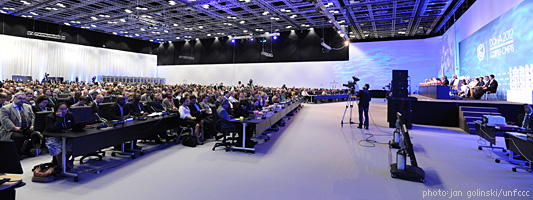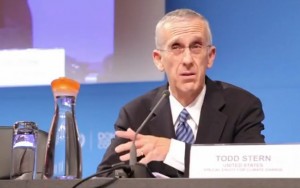(Doha, Qatar) COP 18 negotiators failed to reach agreement on Friday and extended the conference into Saturday.
Earlier in the conference, CFACT reported on the potentially trillion dollar “Green Climate Fund.” This fund has proven a crucial sticking point as developing nations demand direct  handouts from the U.S. and its allies and/or payments from UN controlled carbon taxes. They assign a climate “guilt” to the prosperous free world and see this fund as a form of reparations for the sin of having undergone the industrial revolution.
handouts from the U.S. and its allies and/or payments from UN controlled carbon taxes. They assign a climate “guilt” to the prosperous free world and see this fund as a form of reparations for the sin of having undergone the industrial revolution.
The U.S. and other developed nations prefer private finance in the form of industry shakedowns and green “investments” that they hope will keep payments to the fund off their national books and possibly benefit politically favored business interests.
Developing nations delegates present the conference with a long list of hardships their countries experience such as poverty, famine, drought, erosion and extreme weather and demand compensation. However, as CFACT reported this week, with a total possible warming of only .74 degrees Celsius and no warming for 16 years, attributing these present day problems to climate change reflects lack of understanding at best and shameless propaganda at worst.
The problems which beset the developing world command our sympathy, but they were not caused by climate change and certainly not free market industrialization. In reality, free markets represent the way forward for developing nations. Contrast the economic vibrance of India, Brazil, Chile, China and the four “tigers” of Southeast Asia with the desperate poverty experienced in the moribund controlled or corrupt economies of so many UN nations. It is economic prosperity which provides nations the resources to respond to natural disasters and lend their neighbors a helping hand.
not caused by climate change and certainly not free market industrialization. In reality, free markets represent the way forward for developing nations. Contrast the economic vibrance of India, Brazil, Chile, China and the four “tigers” of Southeast Asia with the desperate poverty experienced in the moribund controlled or corrupt economies of so many UN nations. It is economic prosperity which provides nations the resources to respond to natural disasters and lend their neighbors a helping hand.
The other big stumbling block for the negotiations is CO2 emissions targets. If we can ignore for a moment the collapse of the troubled science which argues for limiting use of fossil fuels, we can at least acknowledge that the expiring Kyoto protocol failed to have any meaningful impact on CO2 emissions. For years, UNFCCC nations decried the absence of the United States from Kyoto. The announcement by Russia, Japan, Canada and others that they will not enter into another commitment period makes another Kyoto style agreement unlikely. Here again the conflict of interest between the developing and the developed nations is stark.
China, India and their climate allies refuse to bind their own nations to significant emissions reductions, while insisting that the U.S. and its allies do so. They justify this again by assigning a past carbon debt to those nations which prospered through freedom and the industrial revolution.
 It is hardly the fault of the free world that China, which is rapidly building coal plants and is today and tomorrow’s top CO2 emitter, sat out the prosperity of the second half of the 20th century mired in Communism and its attendant poverty. The sins that China perpetrated on Korea, Tibet, Asia and its own people under Mao and his successors are surely deeper than any committed by the free world indulging in agriculture, industry, automobiles, air conditioning and detached housing.
It is hardly the fault of the free world that China, which is rapidly building coal plants and is today and tomorrow’s top CO2 emitter, sat out the prosperity of the second half of the 20th century mired in Communism and its attendant poverty. The sins that China perpetrated on Korea, Tibet, Asia and its own people under Mao and his successors are surely deeper than any committed by the free world indulging in agriculture, industry, automobiles, air conditioning and detached housing.
The talks are continuing from Friday night into Saturday. At some point, no matter what their divisions, COP 18 delegates will proudly announce some great gain. CFACT is keeping close watch. Let us hope that a combination of fatigue, pressure from left-wing NGOs and lack of opposing pressure from voters back home don’t lead the U.S. delegation and its free world allies to give away much. Every dollar, euro and yen they pledge will be wasted and used against us. Every inch they lead us down the path away from freedom and national sovereignty will be treacherously difficult to claw back from.

